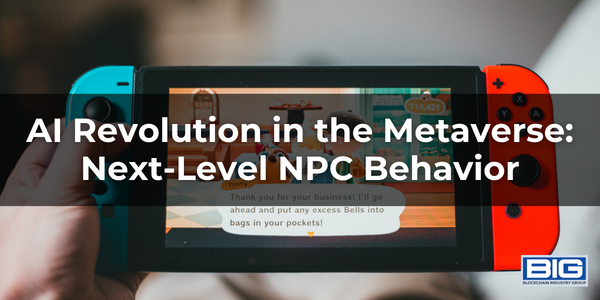
In the ever-expanding landscape of the metaverse, artificial intelligence (AI) is poised to revolutionize the behavior of non-player characters (NPCs), taking immersion and interactivity to new heights. NPCs have long played supporting roles in virtual worlds, providing quests, guidance, and companionship to players. However, advancements in AI technology are now enabling NPCs to exhibit human-like behavior, emotions, and decision-making capabilities.
In this in-depth article, we will delve into the AI revolution in the metaverse, exploring the potential of next-level NPC behavior and its implications for the future of virtual experiences.
The Evolution of NPCs: From Scripted to Dynamic
Traditionally, NPCs in virtual worlds were scripted entities that followed predetermined patterns and responses. Their behavior was limited, often resulting in predictable interactions with players. However, the integration of AI algorithms and machine learning techniques is transforming NPCs into dynamic entities capable of adapting and evolving in real-time.
For example, in the game “Red Dead Redemption 2,” NPCs display an advanced level of behavior, reacting to the player’s actions, forming relationships with other NPCs, and exhibiting emotions such as fear, anger, or sympathy. These dynamic behaviors create a more immersive and realistic gaming experience, blurring the lines between virtual and real worlds.
Machine Learning and Natural Language Processing
Advancements in machine learning and natural language processing (NLP) are key drivers behind the enhanced behavior of NPCs in the metaverse. Machine learning algorithms enable NPCs to learn from player interactions, analyze data, and make informed decisions based on context and objectives.
NLP algorithms empower NPCs to understand and respond to natural language inputs, allowing players to engage in meaningful conversations and experience more organic interactions. This opens up possibilities for complex dialogue systems, where NPCs can engage in nuanced discussions, provide personalized recommendations, and adapt their behavior based on player preferences.
Emotional Intelligence and Believable NPCs
Another significant aspect of next-level NPC behavior is the integration of emotional intelligence, enabling NPCs to display realistic emotions and empathetic responses. By utilizing emotion recognition algorithms and affective computing techniques, NPCs can perceive and respond to players’ emotional states, further enhancing immersion and connection.
For instance, in the game “Detroit: Become Human,” NPCs exhibit a wide range of emotions and can form emotional bonds with players. The game’s advanced AI system allows NPCs to adapt their behavior based on the emotional context, creating a truly engaging and empathetic virtual experience.
Dynamic Storytelling and Player Agency
The AI revolution in NPC behavior also extends to dynamic storytelling and player agency. NPCs can now actively shape and influence the narrative based on player choices and actions, leading to personalized and branching storylines.
In games like “The Witcher 3: Wild Hunt,” NPCs dynamically respond to players’ decisions, altering their behavior and affecting the overall storyline. This level of adaptive storytelling adds depth and replayability to virtual worlds, as players can explore different paths and witness the consequences of their choices.
Implications for the Future of Virtual Experiences
The advancements in AI-driven NPC behavior have far-reaching implications for the future of virtual experiences and the metaverse as a whole. The increased realism, immersion, and interactivity offered by next-level NPCs can revolutionize various industries beyond gaming.
In virtual training simulations, NPCs with advanced behavior can provide realistic scenarios for skill development in fields such as medicine, aviation, or emergency response. NPCs can act as virtual tutors or mentors, guiding learners through complex tasks and providing personalized feedback.
Furthermore, in social virtual worlds, NPCs with human-like behavior can enhance social interactions, support community building, and facilitate engaging virtual events. They can act as virtual hosts, entertainers, or tour guides, creating memorable experiences for users.
Challenges and Ethical Considerations
While the AI revolution in NPC behavior brings numerous benefits, it also raises challenges and ethical considerations that must be addressed. Some of the key challenges include:
- Ethical AI: Ensuring that NPCs’ behavior aligns with ethical standards and respects user privacy is crucial. Developers must establish guidelines and safeguards to prevent NPCs from engaging in harmful or malicious activities.
- Bias and Discrimination: AI algorithms are susceptible to bias, and this can inadvertently manifest in NPC behavior. Efforts must be made to train AI models on diverse datasets and continuously monitor and address any biases that may emerge.
- Player Agency and Autonomy: Balancing NPC autonomy and player agency is essential. NPCs should enhance player experiences without infringing on their freedom of choice or manipulating their decisions.
- Emotional Manipulation: NPCs with advanced emotional intelligence can potentially manipulate players’ emotions. Developers must exercise caution to ensure that emotional manipulation is not exploited for unethical purposes.
- Technical Limitations: The implementation of next-level NPC behavior requires significant computational power and resources. Addressing technical limitations and optimizing AI algorithms is necessary to ensure smooth and seamless experiences for users.
Augmented Reality (AR) vs. Virtual Reality (VR)
—
Business Opportunities in the Metaverse
—
Comparing and Contrasting: Microsoft HoloLens, HTC Vive, and Oculus Quest
The AI revolution in NPC behavior represents a significant milestone in the development of the metaverse. The integration of AI algorithms, machine learning, and emotional intelligence empowers NPCs to exhibit dynamic behavior, engage in meaningful interactions, and shape immersive virtual experiences. As AI technology continues to advance, the potential for next-level NPC behavior in the metaverse will unlock new possibilities in gaming, training simulations, social interactions, and beyond. However, it is vital to navigate the associated challenges and ethical considerations to ensure that NPC behavior aligns with user expectations, promotes inclusivity, and enhances the overall quality of virtual experiences in the metaverse.



